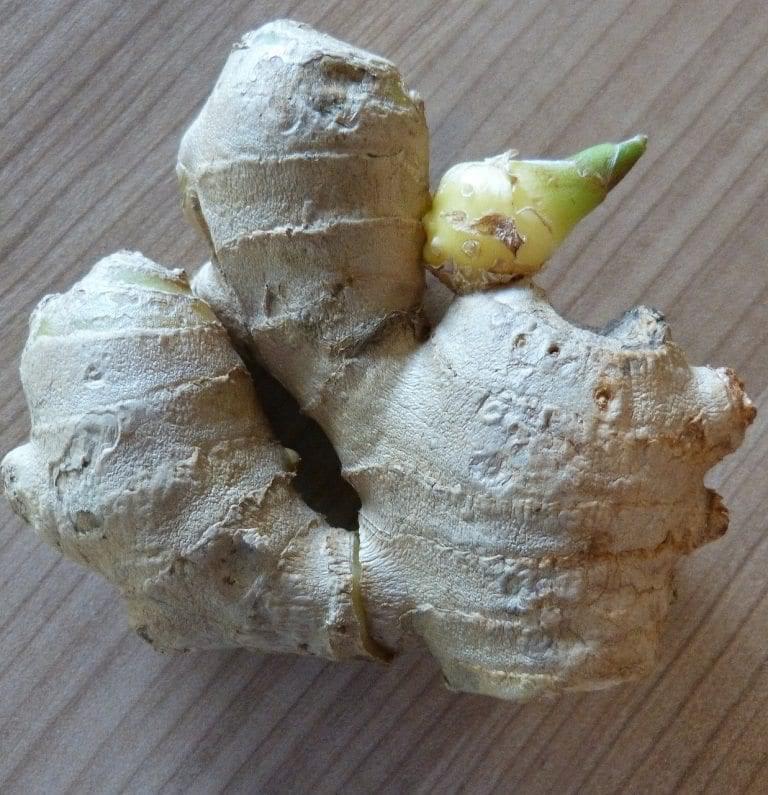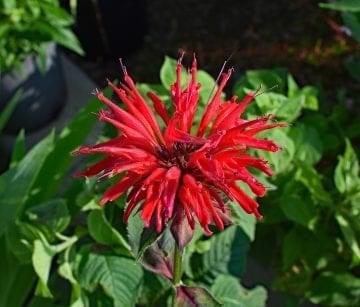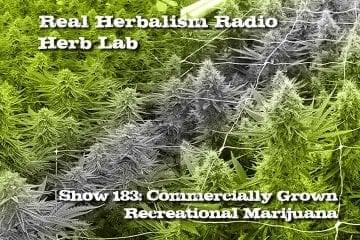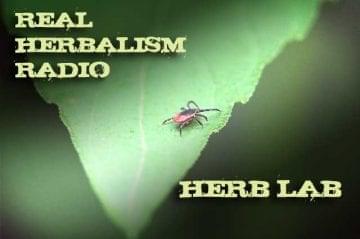Zingiber officinalis – Ginger family
a.k.a.: Race Ginger, Black Ginger, Zingiber, Jamaican Ginger, Jake Root

Ginger is a delicious addition to any kitchen spice cabinet. The gingerbread cookies we decorated during the holiday season were, according legend, based on a sprightly idea by Queen Elizabeth I of 15th century England. Her original ginger flat bread was based on a recipe that came to us from 2400 b.c.e. Greece, traveled through China on the Silk Road, and ended up tickling the fancy of kings and queens alike.
Ginger is more than a tasty cookie. It’s powerful medicine. Known throughout the ages as a digestive aid, ginger has been a quick and easy fix for upset stomachs. This tropical root has more tricks up its sleeve. It can help both the respiratory and circulatory system as well as manage pain control. Ginger is truly an herbalist’s friend.
Medicinal Properties of Ginger
Ginger centers its healing in the stomach. Think of the digestive system as a pathway with exits throughout for certain chemicals to travel to other parts of the body. Ginger digests early in the system, and its properties are quickly assimilated. Its carminative action is triggered within minutes of eating so the smooth muscle system (including the stomach, arteries, lungs and other organs) benefit from ginger immediately.
Ginger is a potent antioxidant. Studies show ginger root has a high concentration of antioxidants as compared to other food items. In this department, only berries and pomegranate can offer more than ginger root.
Ginger has bio-active components in the oily resin of its roots called gingerol. In its natural state, gingerol reduces inflammation. When ginger is cooked, gingerol transforms into zingerone, a natural beta blocker. Beta blockers reduce the effects of stress hormones, including reducing heart rate while helping increase blood oxygenation levels. For heart patients as well as those with anxiety or other conditions that challenge the heart, ginger may well be a boon.
As a beta blocker combined with an antioxidant, zingerone effects the smooth muscle system by increasing its efficiency. Smooth muscles (also known as involuntary) are all over the body. There are even smooth muscle cells in our kidneys. When you add the anti-inflammatory action of antioxidants to the mix, you get significant pain and swelling reduction.
Zingerone also treats digestive issues such as diarrhea and vomiting. Its anti-emetic properties are world renown. Even chewing a ginger candy or taking a few sips of ginger tea will reduce nausea and vomiting within minutes.

When ginger is dried, its gingerol becomes shogaol. This accounts for its anti-tussive and blood pressure reducing properties. Shogaol is readily bio-active and also aids in digestion while contributing to ginger’s spicy, warming flavor.
Ginger is one of a handful of herbs that deplete substance P from nerve endings. Substance P is produce by the nerves when injury occurs. It’s essentially a red alert system we experience as pain. Unfortunately, pain has other side effects. It keeps us awake, causes muscle constriction and is difficult to turn off so we can heal. Ginger drains substance P temporarily so we can fix the problem unhindered.
Ginger is available as an essential oil that contains concentrations of the herb’s medicinal properties. Up to 90 percent of ginger essential oil is sesquiterpenes with a large concentration of zingiberene, curcumene, farnesene, sesquiphellandrene, bisabolene, and monoterpenes. These chemicals effect both the digestive and nervous systems.
Ginger is considered a middle note essential oil and blends well with spicy and citrus oils, as well as eucalypus, frankinsense, geranium, and rosemary essential oils. It’s used in aromatherapy to warm and ground the emotions. For those who suffer from over thinking, for instance, a few drops of ginger essential oil in an aromatherapy burner can help bring them back down to earth so they feel present without feeling groggy or sleepy. Ginger essential oil can also help individuals move through grief and other intense transitions by offering warm, earthy comfort that encourages the individual to move, stay present, and experience each moment as needed.
Ginger essential oil is also mildly antiseptic with a particular affinity for the herpes virus. Those who suffer from cold sores due to the herpes virus, for instance, can benefit from a lip balm made with lemon balm oil, beeswax, and a few drops of ginger essential oil.
As an energetic medicine, ginger is helpful for working with the third chakra energies. This chakra, associated with individual will and power, is often called the fire center. It occupies the space in our bodies where much of our digestion occurs. Thus, ginger is a natural for working with this level of energetic being. For those who need or want to create more balance in their third chakra, ginger is a good choice. It helps stimulate fire, bringing confidence and a sense of purpose to life.
Conditions Best Helped by Ginger
Ginger has a history of reducing nausea and vomiting. A study published in 2014 conducted in a human immunodeficiency virus (HIV) clinic in Tehran, Iran, examined the use of ginger to help patients reduce nausea and vomiting. A significant percentage of patients taking the drug used to treat HIV experience nausea and vomiting, which makes the drug less effective and interferes with patient recovery. The patients in the study who received ginger experienced a significant reduction of adverse digestive symptoms. Ginger proved to be a tremendous ally. Thankfully, ginger’s gentle, tonic nature makes it a perfect go-to herb for those of us who experience nausea and vomiting for less severe conditions as well, including morning sickness, motion sickness, and similar conditions.
Older literature advises caution when using ginger to control nausea and vomiting during pregnancy, but studies conducted since 2001 have shown ginger is an effective and safe anti-emetic and digestive aid. One study, posted in December of 2009 in Midwifery Magazine, compared the standard anti-nausea treatment for pregnant women with vitamin B6 and ginger root. The results leaned strongly in favor of ginger root as a digestive aid to decrease nausea. They found vomiting decreased equally after use of either ginger or vitamin B6. This is good news for mothers in the early stages of pregnancy who suffer from morning sickness.

As an anti-emetic, ginger is great medicine for the nausea and vomiting caused by reactions to heavy medications such as anesthesia and chemotherapy. For cancer patients, ginger can ease the recovery experience considerably.
In flu and cold fighting blends, ginger root’s anti-inflammatory properties along with its ability to ease nausea and vomiting, balance the digestive system, and improve absorption of other medicines make it an of-course sort of herb…Of course you’ll include ginger root! One American favorite, fire cider, makes use of exactly those properties to help patients avoid and recover from bouts of both cold and flu quickly and comfortably. Tea and decoction blends as well as syrups designed for the same purpose often contain a dose of ginger root.
Diabetes type 2 responds well to ginger, too. In this case, ginger improves insulin sensitivity and reduces CRP and PGE2. C-reactive protein, or CRP, indicates the level of inflammation in the body. Prostoglandin E2, or PGE2, causes blindness. High levels of either of these are detrimental to those with type 2 diabetes, so those folks may want to add ginger to their daily diet.
Ginger’s ability to increase sensitivity to medication can be applied broadly to other medications as well. For those who want to better absorb their medications for any reason, ginger is a definite ally.
Ginger is expert in helping heal damaged tissue. It’s frequently added to herbal compounds designed to encourage healing of wounds as well as internal injuries. Sore muscles and achey joints all recover more easily with a little ginger on the scene.
Pain reduction is also on ginger’s list of attributes. It depletes substance P, the chemical nerve cells generate to create the sensation of pain. Substance P is an essential part of our injury alert systems, but once you’re aware of the injury and have taken appropriate steps toward healing it, substance P becomes an obstacle. It’s hard to move, find inner peace and comfort, or just get a good night’s sleep when substance P is activating your pain response. Ginger can help ease internal and external pain.
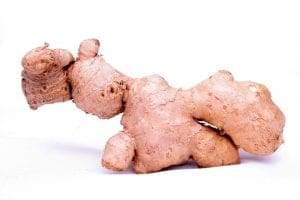
This anti-inflammatory response includes respiratory issues. People with asthma triggered by allergies greatly benefit from a regular dose of ginger tincture. It mediates the TH2 immune response in the lungs that instigates the classic asthma attack. This makes ginger a natural partner with antihistamine herbs such as nettle to protect against allergy attacks.
Ginger can be terrific for those who suffer from rapid heart rates and high blood pressure, too. Anxiety, perimenopause, PMS, and other hormonal imbalances are one set of conditions that can stress the heart. Cooked ginger can help block those stress reactions and promote heart health for folks facing even your garden-variety, everyday sorts of stresses. Folks suffering from more chronic conditions may well find ginger a real life-saver. Heart patients may also find ginger a helpful ingredient in their daily meals. It’s wise, of course, to consult your physician and pharmacist before adding ginger to your diet if you’re taking prescription medicines.
Ginger can help you regain a balanced, assertive approach to life that’s in harmony with the rest of your being. For those who need to overcome laziness, lack of direction, or stress associated with shock or trauma, ginger essential oil or ginger root can also be powerful allies. Try adding a few drops of ginger essential oil to your favorite aromatherapy blend in a diffuser. Or, add a few drops to a handkerchief or other absorbent material to place in your pocket or on your desk or place of work. Conversely, add ginger root to your favorite tea or herbal infusion or incorporate ginger root into your cooking. You can also carry a small piece of ginger root in your pocket. Other herbs to consider combining with ginger for bringing balance to your third chakra include peppermint, cinnamon, nutmeg, and spearmint.
For More Information on Ginger
For more information on ginger, purchase a copy of Ginger: Warming Spice for Health and Life (The Practical Herbalist’s Herbal Folio Book 6). This Herbal Folio contains expanded information, including:
- Gardening and Gathering
- Animal Husbandry
- Household Formulas
- History, Folklore, Myth, and Magic
- Cautions
- Recipes
- A Printable Quick Facts Card
- References
Proceeds from sales of The Practical Herbalist’s Herbal Folio series go toward supporting The Practical Herbalist website. Support this terrific reference site by buying your copy of Ginger: Warming Spice for Health and Life (The Practical Herbalist’s Herbal Folio Book 6) today.

